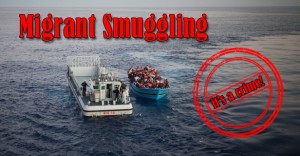The UN Security Council is expected to vote, possibly as early as Thursday, on a draft resolution authorizing European military action against migrant smugglers in the high seas off Libya’s coast, diplomats said.
European warships launched Operation Sophia on Wednesday to seize traffickers’ boats in international waters and stem the tide of migrants making the perilous journey across the Mediterranean.
The British-drafted measure would give UN approval to the naval task force, which was not mandatory for the European Union to take action but would provide Operation Sophia with greater legitimacy.
The measure would authorize European naval forces to board ships for inspection, seize them and even dispose of the vessels suspected of being used by migrant smugglers.
The text drafted under Chapter 7 of the UN charter, which authorizes use of force, would limit the UN mandate to a period of one year.
Presented to the Security Council last month, the draft resolution ran into opposition from African countries and Venezuela, while Russia raised questions about the measure.
African countries, however, appeared to have changed their stance after Libya’s internationally-recognized authorities said they had dropped their opposition to the proposed resolution.
“The Libyan authorities are content with that work which I hope means we will be ready to vote on it in the coming days,” British Ambassador Matthew Rycroft told reporters. Britain circulated a revised draft resolution to the 15 council members on Tuesday along with a letter from the Libyan ambassador stating that his government “is no longer objecting” to the text.
Russian Deputy Ambassador Petr Iliichev told reporters Moscow had “some concerns” about the draft text on migration amid intense diplomacy over a separate proposed resolution on the Syria crisis.
Russia is one of the five permanent members that have veto power at the council, but diplomats said privately that they did not expect Moscow to block the measure.
Russia however asked for additional time to study the text after Britain sought to put the measure to a quick vote.
Europe hopes that smashing the refugee trafficking networks will help save lives and deter asylum-seekers from making the dangerous journey.
Around 3,000 people have died while crossing the Mediterranean to Europe this year, while over half a million have made the voyage, mostly landing in Greece and Italy.
A five-nation naval task force comprised of an Italian aircraft carrier, a French frigate and one British, one Spanish and two German ships launched the second phase of Europes response to the Mediterranean migration crisis.
The first phase of the operation, which involved monitoring trafficker networks and rescuing refugees from rickety boats crossing the Mediterranean, has been running since June.



